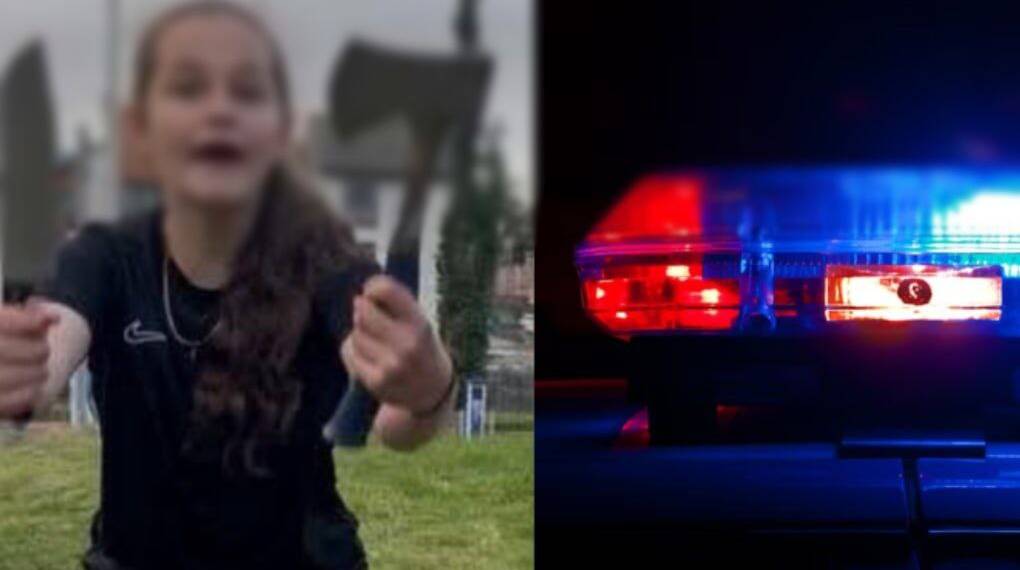A shocking video from Dundee has ignited a wave of anger across the United Kingdom and beyond. The footage shows a 14-year-old girl carrying a kitchen knife and a small axe — not, she claims, to attack, but to protect her 12-year-old sister from a man who was filming them near a bus stop.
In the video, the teenager can be heard shouting: “Don’t touch my little sister, she’s twelve!” Moments later, police arrived and restrained her. Instead of questioning the man filming, officers arrested the girl for possession of offensive weapons.
Police have defended their actions, stating that UK knife laws are clear: carrying blades in public, regardless of intention, is illegal. But the arrest has sparked furious debate. Critics argue the incident highlights “two-tier policing,” where ordinary citizens — even children — face prosecution, while dangerous offenders often walk free.
Grooming Gangs and Britain’s Dark Legacy
The Dundee case has struck a nerve because it echoes unresolved scandals that continue to haunt the UK. For decades, revelations of grooming gangs operating in towns such as Rotherham, Rochdale, Oxford, and Telford exposed systemic failures by police, councils, and politicians.
In Rotherham alone, over 1,400 children — many as young as 11 — were exploited over 16 years. Investigations later revealed that officials often hesitated to act, fearing accusations of racism, as the majority of perpetrators were from Pakistani Muslim backgrounds.
Survivors and whistleblowers have long accused authorities of putting “political correctness” and vote-bank concerns ahead of child protection. Although inquiries and parliamentary debates have acknowledged these failures, many survivors say justice has yet to be delivered.
Public and Political Reactions
The Dundee arrest rapidly went viral, drawing global attention. Billionaire Elon Musk weighed in on his platform X, asking: “What kind of government arrests little girls who try to defend themselves?” He also pledged financial support for legal action against officials accused of covering up grooming gang cases.
His comments fueled a digital firestorm. Hashtags such as #JusticeForDundeeGirl, #ProtectOurDaughters, and #BritainIsBroken trended for days. Survivors of past grooming scandals said the girl’s arrest reminded them of how they were once treated as criminals rather than victims.
Some MPs pushed back, accusing Musk of “interfering in UK politics.” But their criticism was drowned out by widespread online support for the girl. Memes cast her as a “modern Joan of Arc,” while parents, teachers, and public figures voiced frustration at a system they say punishes the vulnerable instead of protecting them.
The Law vs. Reality
Britain enforces some of the strictest knife laws in the world. Carrying a blade without “good reason” is a criminal offense, and self-defense is not considered valid if the weapon is carried in advance.
Supporters of these laws argue they are essential for reducing knife crime. But critics highlight what they see as glaring double standards: in 2024, more than 70,000 rapes were recorded in England and Wales, yet conviction rates remain low. Campaigners argue that while predators often evade justice, even a frightened child can face arrest for carrying a knife.
A Question for Britain
For many, the Dundee case is no longer about a single girl. It has become a symbol of what they see as Britain’s deeper crisis — collapsing trust in institutions, rising fears linked to migration and crime, and a justice system accused of protecting political interests over children’s safety.
The debate is now as much about identity and governance as it is about law enforcement. Critics ask: Does Britain still prioritize the protection of its daughters, or has political caution left them to defend themselves?
As one viral post put it:
“If your daughter carried a knife because she felt unsafe, would you want her arrested — or would you demand a government that protects children first?”
For many watching the events unfold, the answer may determine not just the fate of one teenager in Dundee — but the future of public trust in Britain itself.








